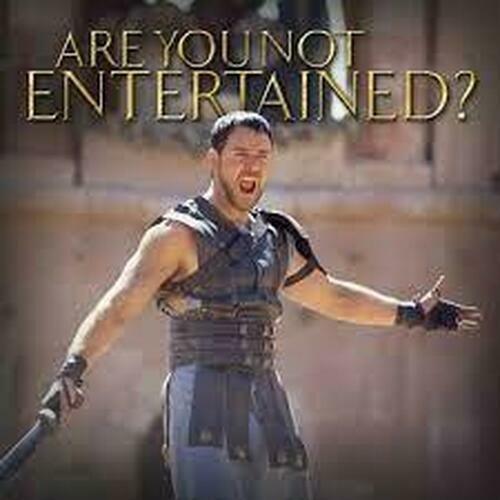All The World’s A Stage: Everything Is Fake
Authored by Charles Hugh Smith via OfTwoMinds blog,
No wonder we’re restless, teetering on the edge, frustrated by our addictions to fakery and excess, starved for what cannot be marketed or made profitable, so it no longer exists except in the shadows.
Everything is staged, and therefore fake. Given the near-zero cost of posting content in the digital world, everyone discovered that staging wasn’t limited to high-end political events, parades and Hollywood sets; since all the world’s a stage, everything could be staged, from every selfie on social media to every video on YouTube to every public display.
With staging comes spectacle, with spectacle comes self-serving artifice, and with artifice comes excess. The captivating idea of staging is by mimicking authenticity, we manifest an implicitly self-serving purpose: we stage the film to mimic “real life” to entertain the audience, and by this means reap a fortune.
By staging a political event, we rouse blood lust to serve our ascension to power. By staging a selfie in a swank bar sipping a costly cocktail, while home is a shared room in a squalid, overpriced flat, we serve our desire for a digitally distributed simulacrum of a status we cannot possibly achieve in our real lives.
Now that everything is staged, the competition to get noticed in a sea frothing with endless scrolls of “content” demands excess. Everything is now so sensationalized that we are desensitized to it all. As a result, everything distills down to self-parody, rendering parody impossible, for everything is already a parody of itself.
Mimicking authenticity to make the sale is now so embedded, so ubiquitous, that irony is also lost: we are living in a Philip K. Dick story come to life in which young women fabricating fake lives of glamor and luxury to boost their visibility are now competing with digitized imaginary young women that are idealized versions of the sexually compelling female.
Now that engagement is the coin of the Attention Economy realm, traditional media and social media have merged: everybody’s competing for engagement because that’s everyone’s source of income. Never mind that the Big Tech platforms skim the bulk of the engagement revenues and a handful of influencers reap the majority of what’s left; the mob is furiously dedicated to the task of picking up the pennies scattered in the sand-covered floor of the Coliseum.
In my view, engagement is the polite term for addiction, the core value proposition in Addiction Capitalism. As every dealer knows, there’s no more reliable source of revenue than a junkie with a monkey on his back, and encouraging addiction to screens is astoundingly profitable.
The fevered competition for eyeballs / visibility has generated a self-reinforcing feedback of faking authenticity better than other spectacles. The goal isn’t to present “real life,” what would be the point of such absurdly uncompelling, boring anti-spectacle?
The goal is to stage the mise en scene so cleverly that it really looks real: the rural kitchen in all its handmade glory, the “real food” lovingly prepared with simple tools, or the high-wire emotions of the indignant, filled to the brim with passionate intensity, planning their role when the rough beast, its hour come round at last, slouches towards Bethlehem to be born.
But authenticity cannot be profitably milked for long; we caught on long ago. The transformation into sensationalized, self-parodying staging makes a mockery of authenticity, and as everyone crowds onto the world stage seeking visibility and the money the right staging brings, authenticity dissipates into dark energy, present but invisible, undetectable, a fleeting shadow lost in the churning wake of spectacle.
French philosopher Guy Debord’s 1967 book, The Society of the Spectacle, sheds light on this transformation. (This is a PDF of the entire text.) “The vague feeling that there has been a rapid invasion which has forced people to lead their lives in an entirely different way is now widespread; but this is experienced rather like some inexplicable change in the climate, or in some other natural equilibrium, a change faced with which ignorance knows only that it has nothing to say.”
This reminds me of a comment French writer Michel Houellebecq made in an interview: “I have the impression of being caught up in a network of complicated, minute, stupid rules, and I have the impression of being herded towards a uniform kind of happiness, toward a kind of happiness that doesn’t really make me happy.”
The ceaseless staging and spectacles have deranged us. The mood of the mob is fast becoming ugly; even the victors of the staged games are being booed. The attention span of the audience has dwindled to the point that few even wait for the outcome of the contest to scream for somebody’s blood. The crowd is no longer satiated by gore or drama, and even the comedic interludes no longer mask the sense that the mob is one spark away from taking their rage and frustration out on each other–the vicarious thrills are no longer enough.
This is the fruit of relying on fakery, of believing that no one can tell the difference between authenticity and staged simulacra. The audience craves something real, and what’s served up as “real” is just another self-serving mise en scene. No wonder we’re restless, teetering on the edge, frustrated by our addictions to fakery and excess, starved for what cannot be marketed or made profitable, so it no longer exists except in the shadows.
* * *
Tyler Durden
Thu, 10/24/2024 – 09:25

